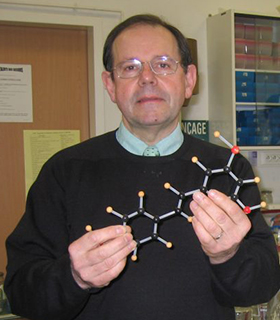Wine and Mediterranean diet, two pillars for wellbeing
Norbert Latruffe & Jean-Pierre Rifler
University of Bourgogne, Bio-PeroxIL laboratory, UNESCO Chair ‘Culture & Traditions of Wine », NMS association « Mediterranean Diet and Health »
6, Bd Gabriel, F-21000 Dijon, France
Wine is one of the major element of the cultural and the nutritional aspects of the multisecular Mediterranean civilization and contribute of wellbeing when used with moderation, especially if associated with the Mediterranean diet. In 2010 the UNESCO world organisation selected the mediterranean diet to the intangible cultural heritage. In the meantime UNESCO recognized the french gastronomic meal. In both, cooking is associated with beverage (wine or tea) in the respect of each community belief.
Mediterranean meal and associated beverage provide food microcomponents including polyphenols, vitamins, fibers, poly-unsaturated fatty acids and oligo-elements brought by fruits, vegetables, olive oil, fish, infusions, etc. In addition wine, especially red wines, provide additionnal unique polyphenols with anti-oxidant properties; for instance, resveratrol, procyanidines, and monophenols including hydroxytyrosol and tyrosol.
Mediterranean diet has been proven to protect against diseases ; cardiovascular (1), breast cancer (2), colorectal cancer (3), to promote longevity (4), and to maintain a good cognition (5), as well as do moderated wine consumption (6).
Is there mediterranean diet across the world? Yes, wine and mediterranean diet are obviously associated to mediterranean climat which is tempered and characterized par by hot and dry summers and mild and humids winters. Indeed, mediterranean climat and diet is not restricted to mediterranean sea area but also in similar regions of the world located between 30 and 40°parallels of latitude. For instance the west face of continents like: California, Chili (center) Cap region in South Africa and Australia (south and west). In all of these countries food and beverage are quite similar and provide good health to the populations. To point out the exceptionnal longevities of the Sarde, Cretan and Okinawa islands living poeple are well known. Surprisingly, while separated of thousands kilometres, Sardes, Californians Adventistes and Okinawa’s poeple, all are privileging a social life, the family, make physical exercices along the life, practice, are no smokers, eat fruits (vitamins), vegetables (polyphenols), whole cereals (fibres), and possibly drink polyphenols-rich beverages i.e. wine (Sarde) or tea (Japanese).
Five years ago we initiated a new association called NMS dedicated to « mediterranean diet and health » with members coming from France, Belgium, Greece, Italy, Lebanon, Luxembourg, Maghreb, Portugal, Spain, etc ; and from various job training ; where the main objectives are : – to provide messages on the effects of polyphenols as anti-oxidants; and from a humanity point of view, the tasting properties, the society perception and the societal image ; – to provide comprehensive data on mediterranean diet, wine and health and their positive impact on human physiology (cardiovascular, cancer, diabetes, aged-linked disorders and s.o.) ; – to promote and sustain the developpment of scientific and medical researches on the beneficial effects of mediterranean diet on health ; – to allow the largest diffusion of knowledge on this topic to a large public by organizing in an optimal manner the information transfert on this topic.
References
- Sofi F. et al., Public Health Nutr. 2014 Dec;17(12):2769-82.
- Villarini M. et al., BMJ Open. 2016; 6(6): e009707.
- Grosso G. et al., Nutr Cancer. 2014;66(4):558-65.
- Boccardi V. et al., PLoS One. 2013 Apr 30;8(4):e62781.
- McEvoy CT, et al., Neurology. 2019 Apr 2;92(14):e1589-e1599.
- Renaud SC, et al., Epidemiology. 1998 Mar;9(2):184-8.
Supported by UNESCO Chair, Culture and Traditions of Wine, Dijon, NMS association, Mediterranean Diet and Health, Dijon and University of Bourgogne, Dijon, France
